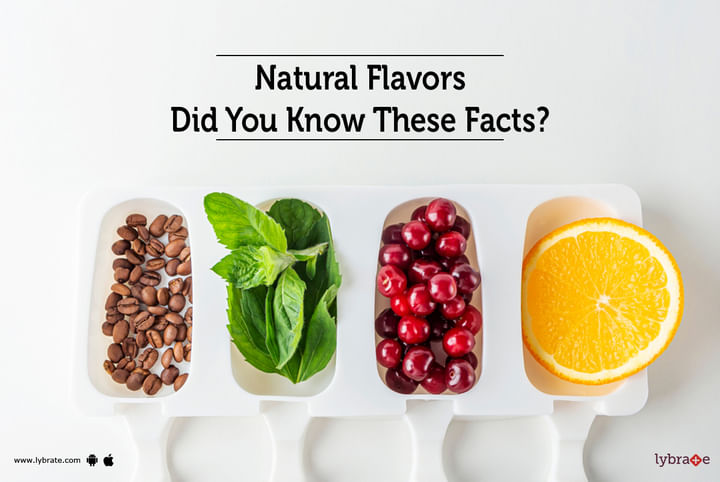Natural Flavors: Did You Know These Facts?
The term 'natural flavors' can be found on a lot of food labels these days, but what does it actually mean? Natural flavors are basically just flavoring agents that are added by food manufacturers to their products, predominantly with the aim of enhancing the taste.
However, the term 'natural flavors' can be quite confusing and even misleading to many people at times. So, this article is here to take a closer look at what natural flavors really are, how they can be compared to artificial flavors, and any potential health concerns pertaining to them.
How Are Most Natural Flavors Made?
Natural flavors are essentially created by extracting substances from plant or animal sources. These flavors can be extracted from:
- Fruit or fruit juice
- Vegetables or vegetable juice
- Spices
- Edible yeast, bark, herbs, root leaves, buds, or plant material
- Dairy products (that also include fermented products)
- Poultry, meat, or seafood
The extracts are usually heated or roasted to obtain the desired flavor. To satisfy the increasing demand for natural flavors, manufacturers have started using enzymes more frequently to extract flavor compounds from plant sources.
Enzymes are said to be able to break down complex carbohydrates into simple sugars, which can then be used to create artificial flavors that satisfy our cravings for sweets without all the added calories.
Natural flavors make most of the foods and beverages present on the market today taste better, and they may also act as preservatives. The natural flavors in them are created by chemists who are trained to make these flavors. A trained professional, however, is not always necessary to create these essential flavors.
Furthermore, attempting to create natural flavors by yourself can be time-consuming and also risky. If you don't have the right tools, then it is a lot easier to go to a professional who uses the right technology to create these flavors.
What Do Natural Flavors Do?
Natural flavors are used to enhance the flavor of a food or beverage rather than to contribute to its nutritional value. They are extremely common in processed foods and beverages. In fact, a number of recent surveys suggest that natural flavors are one of the most common ingredients listed on food labels at present.
Natural flavors are created by manipulating substances found in the natural world, such as plants, herbs, fruits, cream, cocoa beans, vanilla, honey, and nuts. These flavors are a popular substitute for generic artificial flavors and are often used to replicate a natural taste and aroma.
What Are Some Common Natural Flavors?
There are legions of natural flavors that are being used in foods and beverages in today's world. These flavors are generally created by professional food chemists through different ingredients and procedures. Amyl acetate, for example, can be distilled from bananas to provide a banana-like flavor in baked goods.
Citral, which is also referred to as geranial, is usually extracted from ingredients such as lemon, orange, lemongrass, and pimento. Citral is most commonly used in citrus-flavored food items and beverages.
Benzaldehyde is another such chemical that is usually extracted from ingredients like cinnamon oil and almonds, among others. This flavor is quite popular and is used to give foods an almond-like aroma and flavor.
Apart from all that, there is castoreum, which is customarily obtained from the anal secretions of beavers. It can be defined as being slightly sweet and can be used as a substitute for vanilla. However, this flavor is rare owing to its limited availability and high cost.
Other natural flavors that can be commonly found in food items include linden ether for a honey flavor, massoia lactone for a coconut flavor, and acetoin for a butter flavor. All of these flavors can also be created or produced in a laboratory setting by using chemicals. However, they would then be considered artificial flavors.
When looking at an ingredients label, you may have noticed that most of the time it says the food is made with both natural and artificial flavors.
Are Natural Flavors Better and Safer Than Artificial Ones?
When it comes to food, you may be wondering if natural flavors are better than artificial ones. And while it may seem like the healthier choice, you must know that in terms of chemical composition, they are actually quite similar.
The chemicals in a specific flavor can be naturally derived or even synthetic. Furthermore, you will be surprised to learn that there are many artificial flavors that contain fewer chemicals than natural ones.
It must be noted that artificial flavors are less expensive or economical for food manufacturers to produce, which makes them more appealing to most food companies.
While natural flavors may seem healthier, they're not necessarily any better for you than artificial flavors. It is, all in all, quite difficult to determine which flavor is actually better and safer. However, for most people, it is merely a matter of preference.
Conclusion
The main purpose of adding natural flavors to food products is to enhance the taste. The other is to improve the smell of the product to give it a fresh and appetizing smell. The amount of natural flavors added to any given product depends on the nature and quality of the product.
There are different types of flavors available on the market, and the choice of which one to use depends on the type of product. These flavors are essentially added to produce aromas and tastes that may not be present in the original product. However, there is a lot of confusion about what constitutes a natural flavor and how to differentiate it from artificial flavors.
Manufacturers who add natural flavors to their products are usually not required to distinguish them from artificial flavors. However, the only way to find this out is to read the product's ingredients. Furthermore, we hope you find all of the information in this article interesting and useful, and that you keep coming back to us for more and more informative content like this.



+1.svg)
